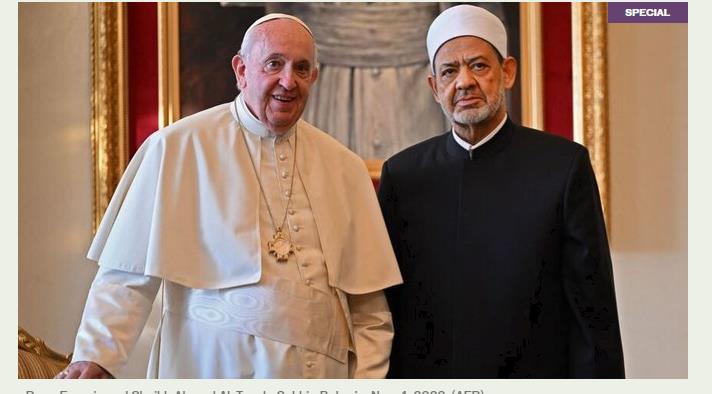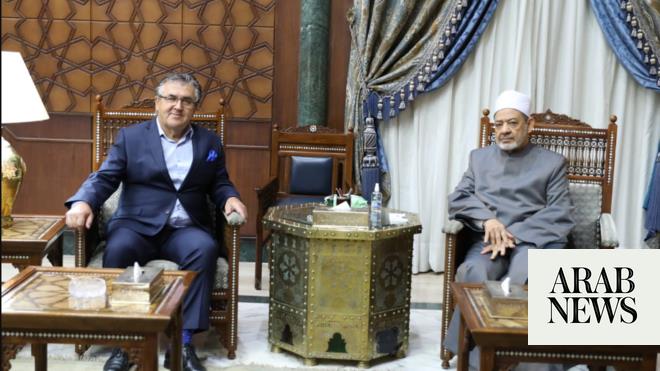
In the blink of an eye, a scientific and intellectual discussion between the Grand Imam of Al-Azhar Sheikh Ahmed Al-Tayeb and President of Cairo University Mohammed Othman Elkhosht at the “Renewing the Religious Discourse” conference turned into some sort of street fight in Egyptian society. Several parties took part in the argument and turned it into what seemed to be a major crisis between the Egyptian state and Al-Azhar, Egypt’s top religious authority.
In fact, the real crisis emerged a while ago. Many journalists in Egypt portrayed the matter of renewing the religious discourse that President Abdel Fattah El-Sisi had demanded of Al-Azhar as a battle — as if Al-Azhar did not wish to renew the discourse; as if it was the sole authority responsible for this; or as if the state had gotten tired of what some had called the “stubbornness” of Al-Azhar, which was standing in the way of these renewal requests. However, this is not the case. The renewal matter needs a lot of time and effort. It is a process that cannot be done overnight and it certainly cannot be entrusted to Al-Azhar alone, but to all of the state’s institutions.
The renewal of the current religious discourse, which many think is the reason behind the rise of extremism and terrorism in Egypt, is a process that requires changes in educational curricula, the media, and social discourse, among others. If we wanted to look for the party responsible for establishing the terrorist ideology and creating terrorist activity, blaming Al-Azhar alone would be unfair. But Al-Azhar bears a part of the responsibility and, thus, has to review its methodologies and separate educational curricula and heritage books. It must declare a clear and loud position regarding the important difference between heritage books — as an intellectual legacy to be preserved with its advantages and disadvantages, as part of the history of the human thought — and the true positions of Al-Azhar regarding issues of public concern.
In any case, preserving the relationship between Al-Azhar and the Egyptian state is my concern now, as many are attacking Al-Tayeb because they may have misunderstood the urgent calls to renew the religious discourse, or they may be seeking to acquire a false honor by creating a rivalry with the grand imam. Many attacked the man, and even the institution, and forgot that its power emanates from the state.
Here, I would like to remind those who have doubted that Al-Tayeb is a statesman of the famous story of Gourna village. Gourna is located on the West Bank of the River Nile opposite Luxor. It was home to many artifacts and was where the tombs of many kings, queens and noblemen lay, along with the most precious treasures of the old Egyptian civilization. Over time, many people sought Gourna’s artifacts in order to sell them, smuggle them, or even melt them down to sell them as raw gold. A lot of architects were also interested in conducting research about the town.
Renowned architect Hassan Fathy built New Gourna in the mid-20th century with a plan to resettle the town’s people away from the artifacts. A few years later, the Gourna People Resettlement Program was established, enabling archeologists to reach more than 50 tombs, and so the region was supposed to be evacuated. The people of Gourna almost clashed with the state, but Al-Tayeb, who at the time lived in Gourna with his family, was the first to pack up his belongings, along with his brother Sheikh Mohammed, and leave the village. They were soon followed by the rest of the villagers.
I would also like to remind Al-Tayeb’s doubters of an incident that took place a few years ago. As Gourna’s people refused to get a medical device moved from their village hospital to Luxor General Hospital, the then-minister of health called for the mediation of the grand imam. He visited and listened to him, and the device was eventually moved, as everyone listened to the voice of the sheikh. This is the attitude of a statesman.
Then there is the important and necessary position Al-Tayeb took over the incursion of the Muslim Brotherhood, as he stood resolute against the group’s ambitions to take down the most important religious institutions in the Islamic world.
Allow me to also remind Al-Tayeb’s doubters of his initiative to return the sums the Egyptian Cabinet had allocated for him as a reward for his work. Sources close to him confirmed he had cut his expenses to be able to return these sums to the state. Moreover, Al-Tayeb has always refused any privileges he could have gained from his status and has never used his status to achieve benefits for himself or his institution. According to news reports, Al-Tayeb does not accept grants or gifts.
Here, let us recall the financial value of the Sheikh Zayed human fraternity award received by Al-Tayeb and Pope Francis last year. The latter donated the full amount of his reward to the Muslims of Rohingya, while the grand imam donated part of his to provide medical treatment for Muslim and Christian children in Upper Egypt, without regard to their religion, and the rest to a charitable organization that takes care of orphans.
Al-Tayeb has created an exclusive Egyptian case that is treasured by Egyptians. He has also proven to be a real Egyptian man; and I am not only talking about the features of “kindness” on his face, which is clear proof that he was aptly named (Al-Tayeb means “the kind”), but also his personality, which is deeply rooted in Egypt’s culture, history, tolerance and diversity. He is a simple man from a simple but well-educated family. Almost all of his ancestors were scholars. He says he inherited his qualities from his late grandfather — a great scholar who died in 1956 at the age of 100 — and that his village, Gourna, is neither a village nor a city. He is a child of the Egyptian civilization that is deeply rooted in history. He is a child of the Egyptian culture that is closely associated with moderation and which faced extremism and violence at various periods in the country’s history.
The vile attacks against the grand imam of Al-Azhar deserve to be reconsidered. I am not only speaking from an intellectual point of view, which is not biased toward or affiliated with Al-Azhar, neither ideologically nor educationally, but also a scientific point of view. I do not agree with what has been circulating recently about a dispute between El-Sisi and Al-Tayeb. Also, I do not think that Egypt’s political leadership is pleased with the campaign against Al-Azhar and its grand imam for many reasons, including the president’s awareness and understanding of Al-Azhar’s role as an extremely important institution to the Egyptian state, nationally and abroad.
We can also say that, today, Al-Azhar is one of the most important elements of Egypt’s soft power. All of the above-mentioned matters are clear proof that the attacks against the grand imam of Al-Azhar are not based on a real understanding of the components of the power of the Egyptian state, in which the institutions — notably Al-Azhar — should be inter-related and following one man.
Dr. Abdellatif El-Menawy is a critically acclaimed multimedia journalist, writer and columnist who has covered war zones and conflicts worldwide. Twitter: @ALMenawy
Disclaimer: Views expressed by writers in this section are their own and do not necessarily reflect Arab News" point-of-view












